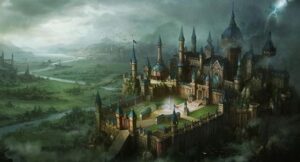This is Faith in Play #64: A Kingdom Allegory, for March 2023.
I was musing on random ideas when my mind stumbled on a setting idea, a piece of a larger world I would expect, into which the characters might wander and which they might find confusing but possibly, what, educational? I have couched it as an occidental medieval fantasy, but I can see how it easily could be recast in an Oriental mold, or even a science fiction setting, with very little adjustment. Mind, I have no idea what characters would do in this setting, but that’s not usually a problem.

I envision the characters coming through a mountain pass into a large broad valley. At the far end they see an opulent castle, but the river which flows down that side of the valley is nearly dry, and the valley, clearly structured for farmland, is nearly barren. There are peasants living in primitive houses which suggest that these are temporary homes, and they have very little food or drink and nothing they are willing to share.
I hope that my characters choose to travel across the valley to the castle. The locals won’t encourage this; they will say that the king is a miser who does nothing to help his subjects in the valley during this drought; the drought has been going for at least as long as anyone has been alive, or that they remember their progenitors saying. If pressed, some will say that obviously the king couldn’t do anything anyway, and others that he certainly could but chooses to ignore the need.
Assuming they reach the castle, they will be greeted warmly at the gate by people who seem simultaneously to be household staff and noblemen of the realm. They will be offered all the best accommodations–baths, rooms, meals. Discovering that the party is travelers from outside the valley will make these nobles even more interested, and they will insist that the group dine with the king that evening.
The dining room will be filled, but there will be adjacent dining areas with space for more people. It will be evident that many of the people there are peasants. The king has on staff many wizards and clerics who produce food (or in your science fiction version hydroponics greenhouses and food replicators), and the meal is lavish. The king will ask of their adventures, of the world beyond the valley, and show a clear interest–but he will show an equal interest in everyone present. As the meal is ending the diners will all make a point to pass by the main table and thank him for his generosity, and he will graciously tell them they are welcome, he is glad to do it.
Investigating further, the characters will determine that the castle gates are open to everyone. The king is unable to do anything about the drought, but he offers food and drink and other amenities to anyone who comes. They may stay as long as they wish.
If they are curious enough to go back and talk to the peasants in the valley, they will find that this offer of free food is common knowledge. As to why the people don’t leave their homes and move into the castle, the primary reasons are that they don’t want to give up their autonomy by leaving their hovels behind, and that the king expects people who accept his hospitality to be grateful, and they do not want to owe him even that.
I’m liking this idea a lot, and as soon as I figure out how to build a story around it I’ll probably use it in one of my novels. If you have ideas for what kinds of adventures might arise from this, I would love to hear them, but I don’t guarantee I won’t (or that I will) use them.
Previous article: Inadequacy.
Next article: Family.
